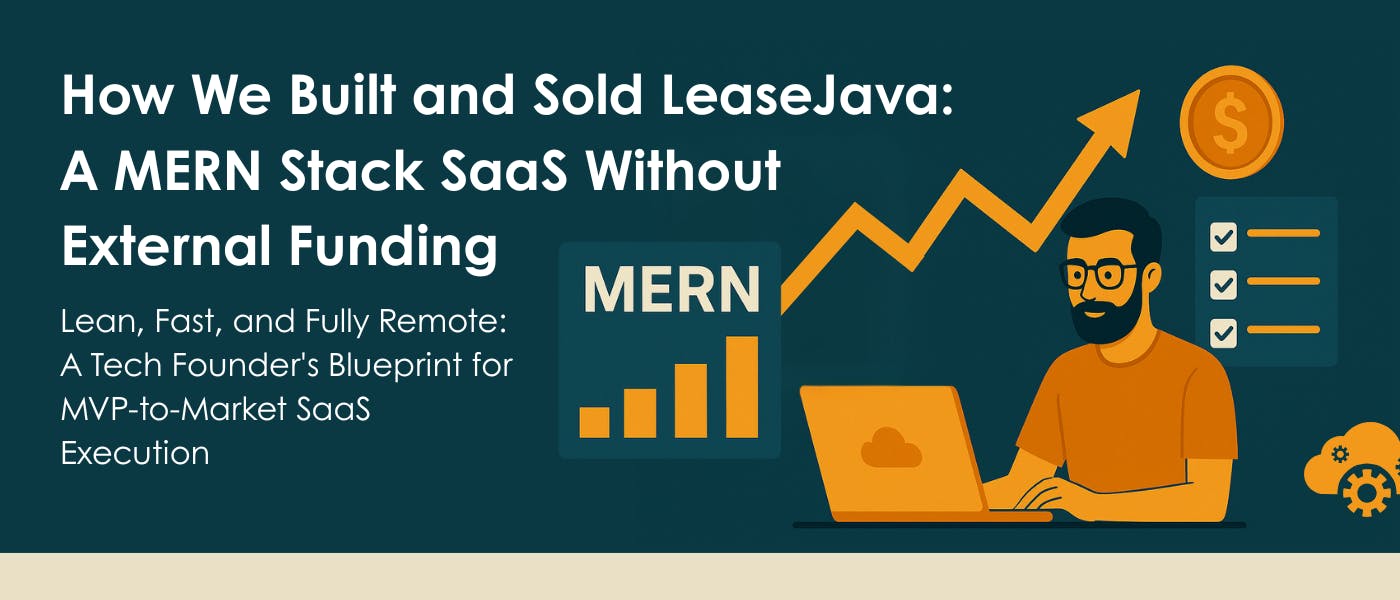I Built a Lease Compliance SaaS and Bootstrapped it From MVP to Acquisition—Here’s How

MMS • RSS
Posted on mongodb google news. Visit mongodb google news

The Problem We Set Out to Solve
In late 2021, with companies still adjusting to the post-COVID economy, lease accounting compliance under ASC 842 and GASB 87 had become a nightmare.
Spreadsheets kept crashing. Traditional ERP modules were bloated, expensive, and difficult to configure.
Mike Cheng, a partner at Frazier and Deeter (and my former colleague from FASB days), saw the pain firsthand. We decided there was a real opportunity: build a lean, modern SaaS tool that could automate lease calculations, simplify compliance tracking, and actually be usable for mid-sized businesses, not just Fortune 500s.
And so, LeaseJava was born.
Why We Chose the MERN Stack (MongoDB, Express.js, React.js, Node.js)
We knew from Day 1 that speed, scalability, and developer productivity would make or break the project.
After evaluating several stacks, we choseMERN for three main reasons:
-
Rapid Development: JavaScript across front and back end meant faster prototyping and fewer handoffs.
-
Scalability: MongoDB’s flexible document model fit the variable nature of lease contracts perfectly.
-
Cost Efficiency: Open-source tools allowed us to scale without heavy licensing fees.
Bonus: Our offshore development team at Infiny (Mumbai, India) already had deep MERN expertise, further compressing our ramp-up time.
How We Bootstrapped Development
We had no external funding. Every dollar mattered.
Here’s how we built LeaseJava lean:
-
Tight MVP Scope: We ruthlessly prioritized features that mapped directly to regulatory needs—no vanity metrics, no “nice-to-haves.”
-
Remote Collaboration: Coordinated across U.S. and India time zones via Zoom and Jira. Agile sprints every 2 weeks kept the momentum.
-
In-House PMO: While I personally managed sprint planning and QA while Mike shaped Product Requirements, user workflows, UI design, and functional priorities.
-
Serverless First: We minimized backend costs early by designing for serverless scaling (AWS Lambda, MongoDB Atlas, etc.).
-
Rapid Pilot Feedback: Early pilot customers got hands-on fast, and their feedback shaped 70% of our v2 backlog.
Engineering Lessons Learned
-
Small Teams Win Fast: Our core team never exceeded 5 people during MVP buildout. Decision-making was quick, and handoffs were minimal.
-
Don’t Over-Engineer Early: Version 1.0 didn’t need multi-language support, custom analytics, or integrations. Focus on the painkillers first.
-
Compliance Logic Is a Beast: Accounting for present value calculations, asset amortization, lease modifications, and remeasurements required a deep functional understanding, which we codified into reusable modules.
-
UX Matters More Than You Think: Lease accounting is complex. Making it visually simple (dashboards, alerts, guided steps) increased user adoption dramatically.
The Outcome: From MVP to Acquisition
- Within 6 months, LeaseJava launched a pilot-ready MVP.
- Within 18 months, it achieved profitability with paying customers.
- And by December 2024, Caseware—a global leader in accounting software—acquired LeaseJava.
👉 Read the official Caseware acquisition announcement.
Final Thoughts: What I’d Tell Any Technical Founder
- Start with the Stack You Can Ship Fast: Speed to MVP matters more than theoretical scalability in the early days.
- Relentlessly Cut Scope: Every feature either solves a real user pain or it doesn’t.
- Respect UX from Day 1: Tech doesn’t win alone. Simplicity wins.
- Bootstrap When You Can: Constraints make you smarter and more disciplined.
From a few Zoom calls to a live SaaS product to a successful acquisition — all without raising a dime.
That’s the power of focus, execution, and engineering discipline.
📬 Thinking of building your own SaaS?
Let’s connect — I’m always happy to swap notes with other founders and technologists.
Find me on LinkedIn or at www.acuvity.com.
Article originally posted on mongodb google news. Visit mongodb google news